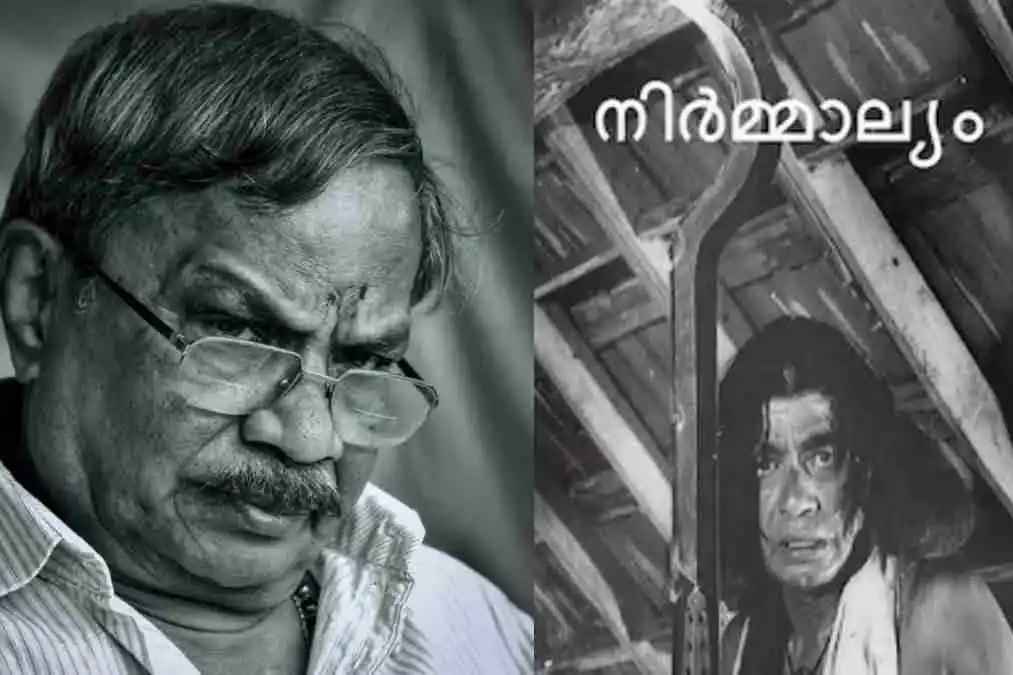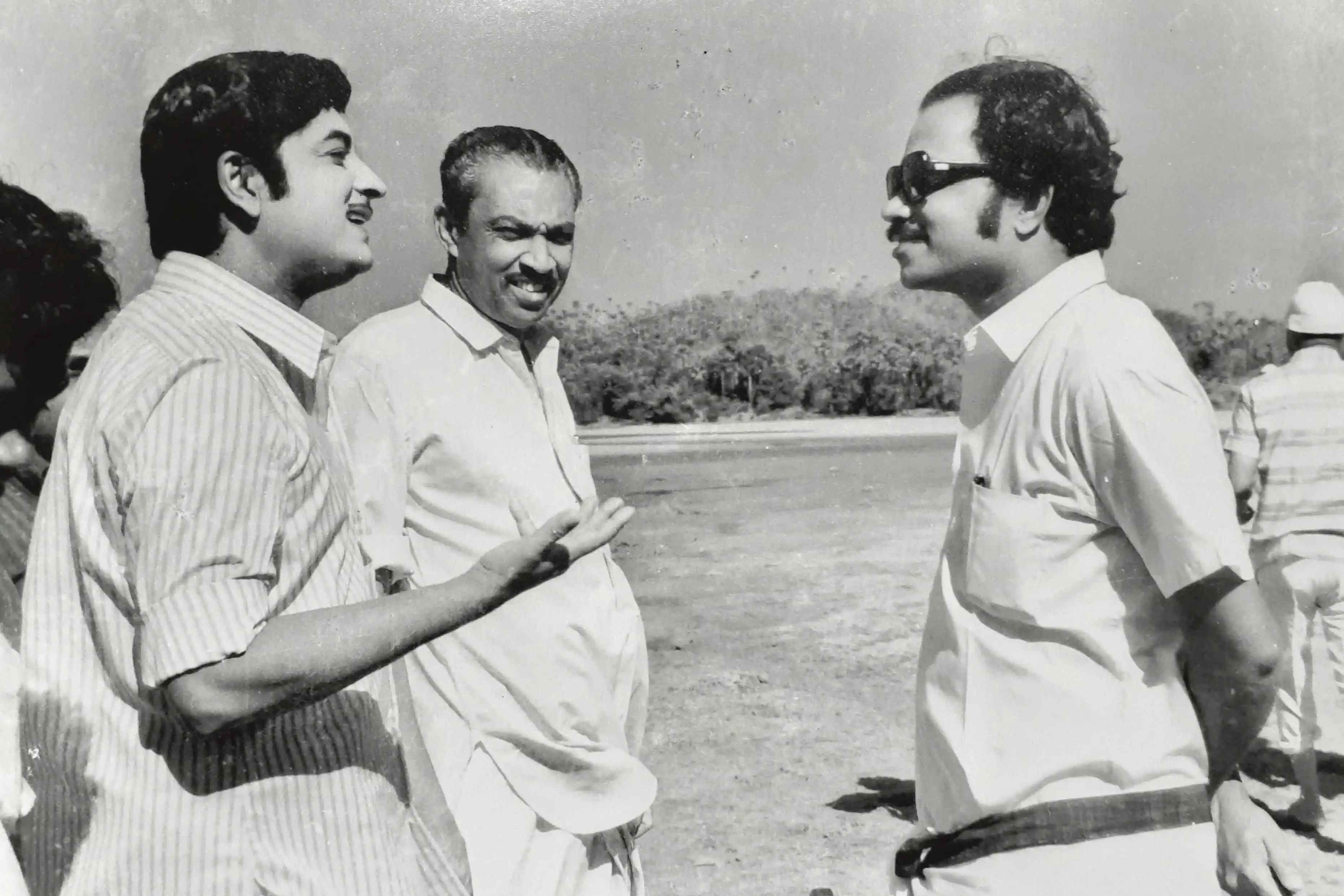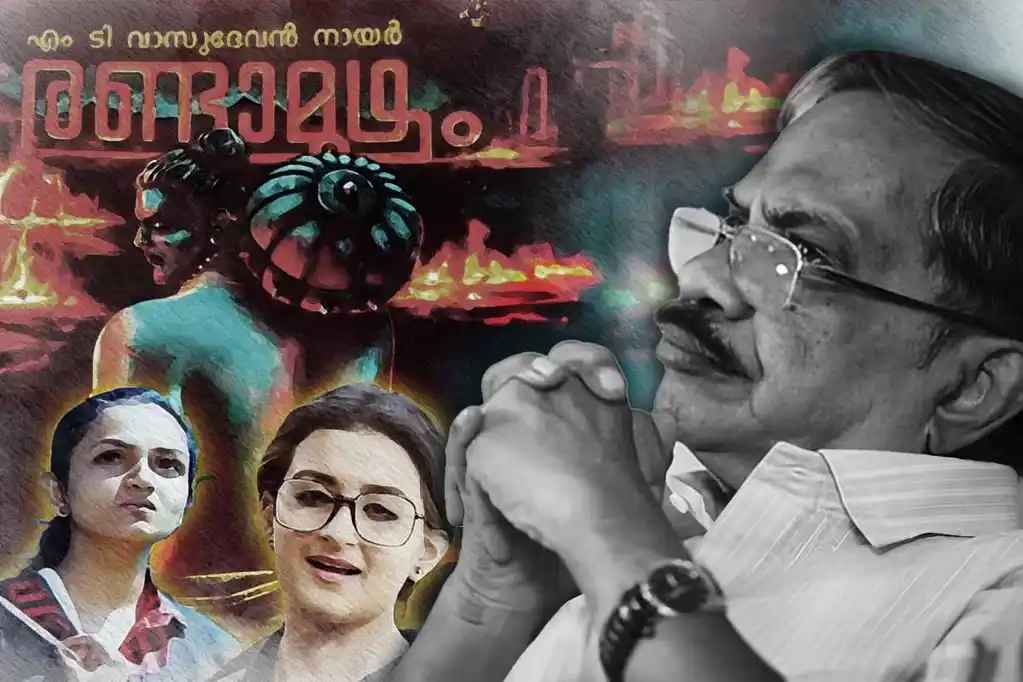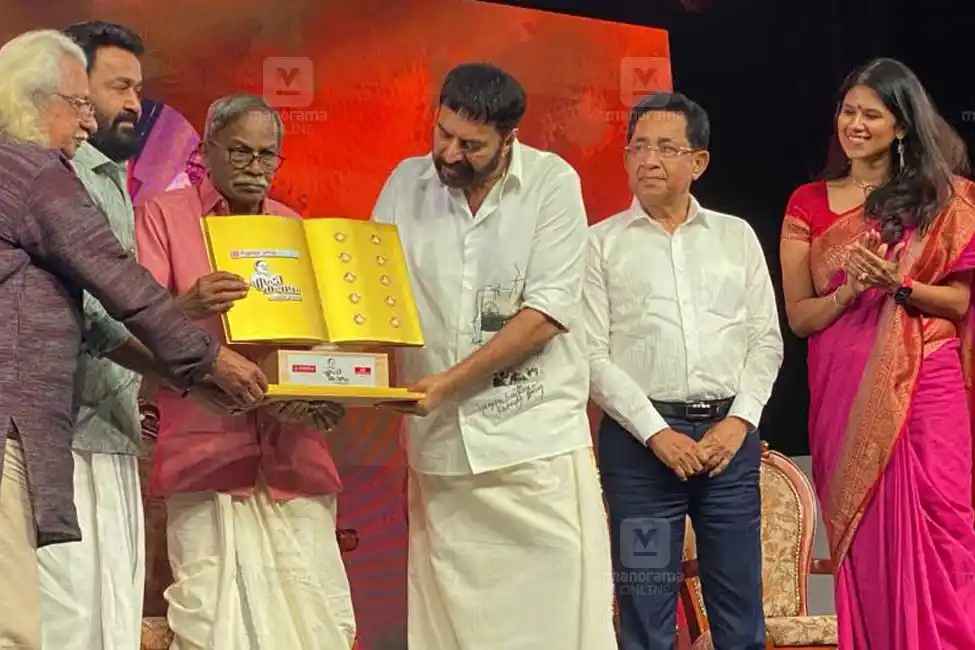M.T. Vasudevan Nair: A Pioneer of Malayalam Literature and Cinema
Updated on : 26 December, 2024

Image Source: thenewsminute.com
M. T. Vasudevan Nair, affectionately known as MT, is a luminary in Indian literature, particularly in the Malayalam language. Born on July 15, 1933, in Kudallur, Kerala, he has made significant contributions as an author, screenplay writer, and director. His debut novel Naalukettu (1958) explores the decline of traditional family structures and won the Kerala Sahitya Akademi Award.
Nair's works often delve into themes of matriarchy and human emotions, with notable novels including Randamoozham, Manju, and Asuravithu. In cinema, he has written screenplays for over 54 films and directed seven, winning multiple National Film Awards for Best Screenplay. His storytelling has profoundly shaped both literature and cinema in Kerala, making him a revered figure in contemporary Indian culture.
Overview of M. T. Vasudevan Nair
M. T. Vasudevan Nair, born on July 15, 1933, in Kudallur, Kerala, is a celebrated figure in Indian literature and cinema. Renowned for his versatility as a writer and filmmaker, he has made significant contributions to modern Malayalam literature. His literary career began with the acclaimed novel Naalukettu, which explores family dynamics within Kerala's matriarchal society. Nair's works often reflect themes of nostalgia, cultural identity, and societal change. As a filmmaker, he has directed several influential films and penned numerous screenplays, earning multiple National Film Awards for his contributions to Malayalam cinema.
Significance in Literature and Cinema

Image Source: mathrubhumi.com
M. T. Vasudevan Nair's significance in literature and cinema is profound, marked by his ability to encapsulate the complexities of human experiences. His literary works, particularly novels like Naalukettu and Randamoozham, delve into intricate familial relationships and societal changes within Kerala's matriarchal context, earning him accolades such as the Jnanpith Award. His narratives resonate with themes of nostalgia, identity, and loss, reflecting a deep understanding of the human condition.
In cinema, Nair's screenplays have elevated Malayalam storytelling by infusing emotional depth and cultural nuances, with films like Nirmalyam and Oru Vadakkan Veeragatha showcasing his innovative approach to narrative. His contributions have left an indelible mark on both fields, ensuring his legacy endures.
Early Life and Education

Image Source: mathrubhumi.com
M. T. Vasudevan Nair, born on July 15, 1933, in Kudallur, Kerala, emerged from a family that deeply valued education and storytelling. As the youngest of four children of T. Narayanan Nair and Ammalu Amma, he was influenced by the rich oral traditions of his community, which played a significant role in shaping his literary sensibilities.
Educational Journey
Early Education
Vasudevan Nair completed his schooling at Malamakkavu Elementary School and Kumaranelloor High School. His educational environment fostered his early interest in literature and storytelling, allowing him to engage with various narratives that would later influence his writing.
Higher Education
In 1953, he graduated with a degree in Chemistry from Victoria College, Palakkad. Although he faced interruptions in his education, his passion for writing flourished during this period. Even before graduating, he began to gain recognition for his short stories, winning accolades that highlighted his emerging talent as a writer.
Early Influences
Growing up in an upper-caste Nair family along the banks of the river Nila, Vasudevan Nair's experiences were deeply intertwined with the agrarian life of Kerala. This setting provided him with a wealth of material for his future works, as he drew inspiration from the cultural and social dynamics of his surroundings.
His early career included teaching positions at various schools and working as a gramasevakan at a block development office. In 1957, he joined Mathrubhumi Weekly as a sub-editor, marking the beginning of his professional journey in literature and journalism.
M. T. Vasudevan Nair's formative years laid the foundation for a prolific career that would see him become one of the most celebrated figures in Malayalam literature and cinema, known for his evocative storytelling and profound exploration of human emotions.
Literary Career
Debut Novel: Naalukettu
Synopsis and Themes
M. T. Vasudevan Nair's debut novel, Naalukettu (1958), translated as "Ancestral Home," poignantly explores the decline of the traditional joint family system in Kerala through the experiences of its protagonist, Appunni. The narrative delves into themes of familial bonds, societal transformation, and the cultural identity inherent in Kerala's matriarchal society, reflecting the emotional and psychological complexities faced by its characters.
Critical Reception and Impact
Upon its publication, Naalukettu received widespread acclaim for its sensitive portrayal of family dynamics and societal changes, earning Nair the Kerala Sahitya Akademi Award shortly after its release. The novel is regarded as a classic in Malayalam literature, solidifying his status as a literary icon and contributing to a renaissance in Malayalam fiction.
Notable Works
- Randamoozham: Often considered Nair's masterpiece, this novel reimagines the Mahabharata from the perspective of Bhima, offering a fresh interpretation of the epic's themes and characters.
- Manju: This work explores themes of love, longing, and personal growth within the context of familial relationships.
- Kaalam: A reflective narrative that contemplates the passage of time and its impact on human connections.
- Asuravithu: This novel examines familial ties against societal expectations, highlighting the struggles within traditional structures.
Themes in His Writing
- Matriarchy: Many of Nair's works focus on the intricacies of matriarchal family structures prevalent in Kerala, showcasing their complexities and challenges.
- Nostalgia and Loss: His narratives often evoke a sense of longing for lost relationships or bygone eras, capturing the emotional depth of his characters' experiences.
- Human Emotions: Nair skillfully navigates complex emotional landscapes, portraying the inner lives and struggles of his characters with sensitivity and nuance.
Film Career
M. T. Vasudevan Nair's contributions to Malayalam cinema began with his screenplay for Murappennu (1965), marking the start of a prolific career in film. Over the years, he wrote screenplays for approximately 54 films and directed seven notable projects, significantly impacting the industry. His directorial debut, Nirmalyam (1973), won the National Film Award for Best Feature Film, showcasing his ability to craft compelling narratives that resonate with audiences.
Nair's screenplays are celebrated for their depth and emotional complexity, earning him the National Film Award for Best Screenplay four times for Oru Vadakkan Veeragatha (1989), Kadavu (1991), Sadayam (1992), and Parinayam (1994)—a record in the screenplay category. His films often explore themes of familial relationships and societal issues, reflecting his literary background and deep understanding of human emotions. Through his innovative storytelling, Nair has left an indelible mark on Malayalam cinema, influencing generations of filmmakers and writers alike.
Notable Films

Image Source: thenewsminute.com
-
Nirmalyam (1973): M. T. Vasudevan Nair's directorial debut, Nirmalyam, won the National Film Award for Best Feature Film. This poignant narrative explores the themes of neglect and spiritual conflict within a community centered around a crumbling temple, showcasing the struggles of its caretaker, the Velichappadu, played by P. J. Antony, who won the National Film Award for Best Actor for his performance.
-
Oru Vadakkan Veeragatha (1989): This historical epic received critical acclaim for its storytelling and character development. The film reinterprets the legendary tale of Chandu Chekavar, emphasizing themes of honor and betrayal while providing a nuanced portrayal of its characters.
-
Kadavu (1991): Kadavu beautifully captures the essence of human relationships against the backdrop of societal changes. The film reflects on love and sacrifice, showcasing Nair's ability to weave emotional depth into his narratives.
-
Sadayam (1992): Another significant work in Nair's filmography, Sadayam highlights his narrative prowess. The film deals with themes of love and redemption, exploring the complexities of human emotions and societal expectations.
M. T. Vasudevan Nair's films not only showcase his storytelling skills but also contribute to the rich tapestry of Malayalam cinema, reflecting cultural nuances and deep emotional truths.
Awards and Recognition in Film

Image Source: manoramaonline.com
M. T. Vasudevan Nair has received significant recognition in the realm of Malayalam cinema, particularly for his exceptional screenwriting. He won the National Film Award for Best Screenplay four times, making him one of the most celebrated screenwriters in Indian cinema. His notable films that earned this prestigious award include:
- Oru Vadakkan Veeragatha (1989): This historical epic, which reinterprets a classic tale from the perspective of its protagonist Chandu, is widely regarded as a cult classic.
- Kadavu (1991): A film that deeply explores human relationships and societal norms, showcasing Nair's narrative depth.
- Sadayam (1992): This work further exemplifies Nair's ability to weave intricate stories that reflect complex emotional landscapes.
- Parinayam (1994): Another significant screenplay that highlights his storytelling prowess.
In addition to these accolades, Nair directed seven films and contributed screenplays to approximately 54 projects, solidifying his legacy as a pivotal figure in Malayalam cinema. His work not only garnered critical acclaim but also left an indelible mark on the industry, influencing future generations of filmmakers and writers.
Awards and Honors

Image Source: newindianexpress.com
M. T. Vasudevan Nair's literary achievements have been recognized with numerous prestigious awards throughout his illustrious career:
- Jnanpith Award: Awarded in 1995, this is India's highest literary honor, recognizing his outstanding contributions to literature.
- Kerala Sahitya Akademi Awards: Nair received multiple accolades from this esteemed institution for various works, including the Kerala Sahitya Akademi Award for his debut novel Naalukettu in 1958 and for drama in 1982 for Gopura Nadayil.
- Padma Bhushan: In 2005, he was honored with this third-highest civilian award in India for his significant contributions to literature and cinema.
- National Film Awards: Nair won several National Film Awards for excellence in screenplay writing, further establishing his impact on Malayalam cinema.
In addition to these, he received various other honors, including the Kendra Sahitya Akademi Award, Vayalar Award, Vallathol Award, Ezhuthachan Award, Mathrubhumi Literary Award, and O. N. V. Literary Award. His legacy in both literature and film continues to influence and inspire future generations.
Legacy and Influence
M. T. Vasudevan Nair's legacy is profound, inspiring countless writers and filmmakers through his exploration of cultural themes and emotional depth within his narratives. His literary works, characterized by their intricate portrayal of human experiences, have set a benchmark for Malayalam literature, guiding future generations of writers who aspire to follow in his footsteps. As noted in various tributes, his writings will continue to resonate with readers and creators alike, shaping the landscape of Malayalam literature for years to come.
In cinema, Nair's contributions have significantly influenced filmmakers across India, establishing him as a pioneer in Malayalam cinema. His screenplays and directorial efforts introduced a new level of storytelling that emphasized character development and emotional authenticity. Esteemed actors like Mammootty and Mohanlal have acknowledged his unparalleled influence on their careers, reflecting on how his memorable characters shaped their journeys in the film industry.
His ability to weave complex narratives has left an indelible mark on Indian cinema, ensuring that his legacy endures as a cornerstone of both literature and film.
Personal Life

Image Source: manoramaonline.com
M. T. Vasudevan Nair's personal life, while relatively private, reflects his deep connections to both family and culture. He was first married to writer and translator Prameela in 1965, with whom he had a daughter named Sithara, who works as a business executive in the United States. After 11 years of marriage, they separated.
In 1977, Nair married dancer Kalamandalam Saraswathi, a prominent figure in Kerala's cultural scene. Together, they have a daughter named Aswathi, who is also a dancer. Nair's family life has been intertwined with his artistic pursuits, and both of his marriages have influenced his creative output.
Throughout his career, he balanced his personal and professional life, contributing significantly to Malayalam literature and cinema while maintaining strong familial ties. His legacy continues through his works and the impact he had on his family and the cultural landscape of Kerala.
Death of M.T. Vasudevan Nair
M. T. Vasudevan Nair passed away on December 25, 2024, at the age of 91, after a brief illness at a private hospital in Kozhikode. He had been undergoing treatment for respiratory complications and heart failure since being admitted on December 16. Despite initial hopes for recovery, he succumbed to his condition late in the evening.
His death marks the end of an era for Malayalam literature and cinema, as Nair was a towering figure whose contributions spanned over seven decades. He authored numerous acclaimed works, including the classic novel Naalukettu, and received prestigious accolades such as the Jnanpith Award and multiple National Film Awards.
In recognition of his impact, the Kerala government declared December 26 and 27 as days of official mourning, postponing all government events. His funeral is scheduled for December 26 at the Mavoor Road crematorium, with public viewing held at his residence until the afternoon. Tributes have poured in from various quarters, including political leaders and fellow artists, reflecting on his profound influence on literature and cinema in India.
Conclusion
M. T. Vasudevan Nair is a monumental figure in Indian literature and cinema, profoundly shaping Kerala's cultural identity. His debut novel, Naalukettu, poignantly explores familial bonds and societal changes, establishing him as a literary icon. Nair's narratives delve into themes of nostalgia, loss, and human emotions, resonating deeply with readers. In cinema, his screenplays, such as those for Nirmalyam and Oru Vadakkan Veeragatha, elevate storytelling by blending cultural heritage with universal themes. His numerous accolades, including the Jnanpith Award, underscore his impact. Nair's enduring legacy continues to inspire future generations of writers and filmmakers, ensuring his voice remains influential.







